Business
US agrees deal to slash Swiss tariffs to 15% after golden charm offensive
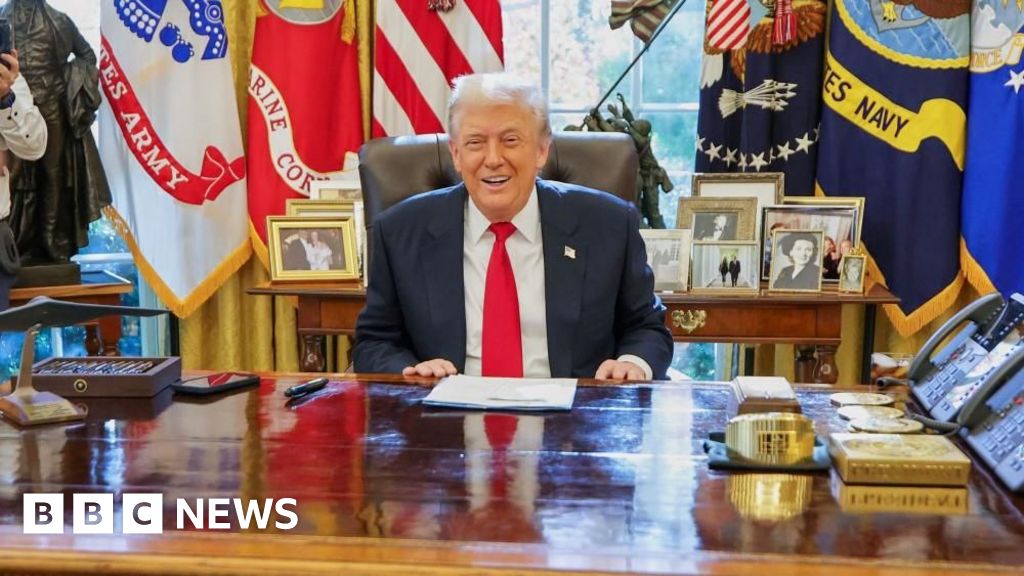
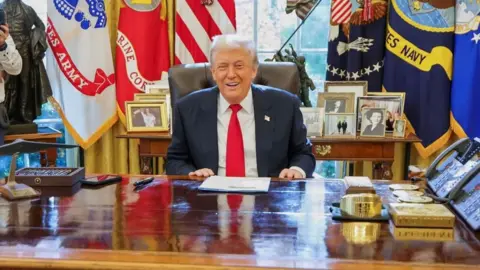 AP
APPaul KirbyEurope digital editor
Switzerland and the US have agreed to cut President Donald Trump’s steep 39% tariffs on Swiss exports to 15%, as part of a deal that involves a Swiss promise to invest $200bn (£150bn) in the US.
“It’s a great relief for our economy,” said Swiss Economics Minister Guy Parmelin, who said significant damage had been done since the additional tariffs had kicked in last August.
Parmelin said a move by Swiss business leaders to meet Trump in the White House last week had proved “decisive” in reaching a deal.
Industry chiefs visited the Oval Office, bearing gifts including a Rolex gold watch and a specially engraved gold bar from Swiss-based gold refining company MKS.
Initial attempts by Swiss President Karin Keller Sutter to change Trump’s mind had fallen on deaf ears. Trump said she “was a nice woman, but she did not want to listen”.
But after the 4 November encounter with Swiss business leaders, Trump revealed this week a deal was being worked on.
US Trade Representative Jamieson Greer confirmed an agreement had been reached, saying “President Trump’s unmatched dealmaking continues to deliver for the American people”.
The deal had involved very hard work, said chief trade negotiator Helene Budliger Artieda. Guy Parmelin said it would bring Switzerland into line with the 15% tariff rate negotiated with the US by its European Union neighbours.
The economics minister said it involved the Swiss economy investing $200bn directly in the US by 2028. A third of that Swiss money will be invested in the US in 2026 under the deal.
Switzerland has also agreed to axe tariffs on a quota of US meat exports including beef, bison and poultry.
Greer said the deal “tears down longstanding trade barriers” and Swiss investment would bring thousands of new jobs.
For Swiss industry, the deal could not come soon enough. Tech exports to the US are down 14.2% on the third quarter of last year, according to latest statistics – a dramatic fall since the tariff hike was imposed in August.
The role of Swiss industrialists appears to have been key, and some particularly those trading in luxury goods, gold, or commodities, already had contacts in Trump’s circle.
In September, Trump appeared at the US Open tennis final in the Rolex VIP box hosted by the Swiss watch company’s chief executive Jean Frédéric Dufour.
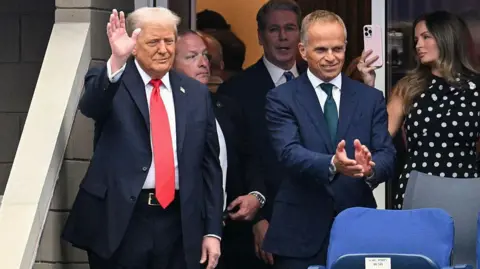 MANDEL NGAN/AFP
MANDEL NGAN/AFPThe president even asked if the Rolex CEO would have been there if Trump had not slapped such steep tariffs on Switzerland.
Last week Dufour met Trump again, this time in the Oval Office, along with fellow business leaders including Johann Rupert from luxury goods maker Richemont and Marwan Shakarchi from MKS.
Days after the meeting, Trump was pictured in the Oval Office with what looked very much like a Rolex “Datejust” desk clock, produced by the company as a collector’s item, and worth tens of thousands of dollars.
A White House official has confirmed to the BBC the two items were given to Trump.
It is quite normal nowadays for visitors to the Oval Office to come bearing a gift.
UK Prime Minister Sir Keir Starmer brought an invitation from King Charles for a lavish state visit. German Chancellor Friedrich Merz offered a framed copy of the birth certificate of Trump’s German grandfather.
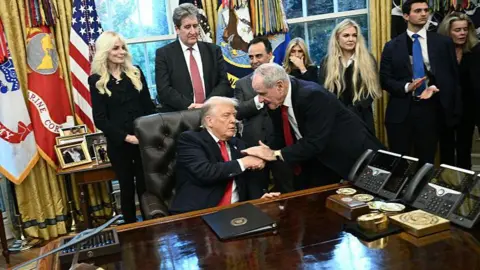 BRENDAN SMIALOWSKI/AFP
BRENDAN SMIALOWSKI/AFPThe US president receives thousands of gifts every year and they then become US property, deposited with the National Archives and filed annually by the state department.
They are eventually transferred to a presidential library. Some gifts can be kept but presidents have to pay federal taxes if they do not come from a close relative.
Swiss industry has been waiting for a deal with bated breath and a number of Swiss companies had warned they would have to furlough staff if nothing changed.
Yves Bugmann, who heads the Swiss Watch Industry Federation, welcomed the deal after months of uncertainty.
Asked what kind of investment the Swiss government might make in the US that would add up to $200bn, Helene Budliger Artieda said there was a detailed list that included pharmaceuticals, but she singled out plans for plane manufacturer Pilatus to build a big US plant and train-maker Stadler to expand its US operations in Utah.
Gold refining is also part of the plan.
“Currently, Switzerland is the primary location for gold storage, and New York is the primary location for trading,” said trade negotiator.
The chief trade negotiator said it would take a few days or even weeks for the changes to come into effect.
The agreement will only become binding when it receives approval from the Swiss parliament, and then it will be put to a referendum.
Business
Gender pay gap won’t close until 2056, warns Trades Union Congress
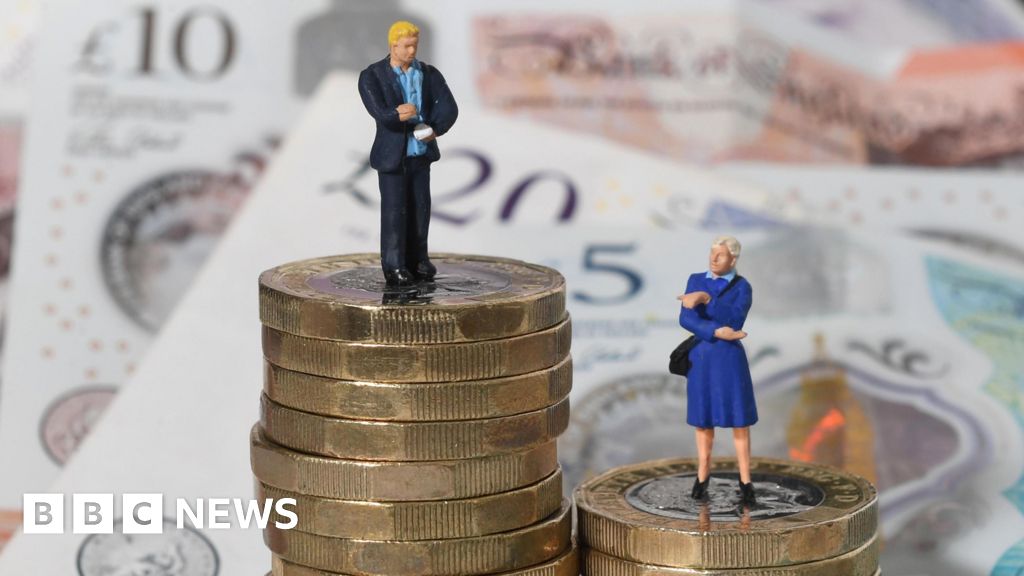
The average woman employee “effectively works for 47 days of the year for free,” according to the Trades Union Congress.
Source link
Business
Gold, Silver likely to consolidate in coming week amid Fed rate-cut uncertainty: Analysts – The Times of India

Precious metal prices are expected to remain volatile and witness further consolidation in the coming week as investors track key US economic indicators, including inflation data, GDP readings and signals from the Federal Reserve, analysts said.Traders are also likely to monitor US labour market data, the minutes of the Federal Open Market Committee (FOMC) meeting and speeches from Fed officials for clarity on the timing and pace of potential rate cuts, as per news agency PTI.
Volatility to persist on US GDP, PCE data
Pranav Mer, vice president, EBG – commodity & currency research at JM Financial Services Ltd, said gold and silver prices may continue to witness consolidative moves, though volatility is expected to persist.“Gold and silver prices may continue to see more consolidative moves but volatility will prevail with focus on incoming US data on GDP and the Personal Consumption Expenditures (PCE) inflation numbers and Federal Reserve official’s commentary,” he said, as per PTI.On the domestic front, silver futures on the Multi Commodity Exchange (MCX) declined Rs 5,532, or 2.2 per cent, over the past week, while gold rose Rs 444, or 0.3 per cent.
Gold corrects sharply in February
Prathamesh Mallya, DVP – research, non-agri commodities and currencies at Angel One, said gold prices have corrected in February.“Gold prices have fallen in February 2026, with prices correcting from highs of Rs 1,80,000 per 10 grams to around Rs 1,53,800 per 10 grams as on February 13,” he said, as per PTI.He attributed the weakness to stronger-than-expected US employment data, which has reduced expectations of near-term rate cuts and weighed on gold prices in the past week.“However, the yellow metal’s safe haven appeal remains intact on account of geopolitical tensions, and strong buying ahead of the Lunar New Year. It’s a tug of war between bears and bulls this week, and the volatility will continue in the week ahead,” Mallya added.
International trends and market drivers
In the international market, Comex gold futures gained $84, or 1.7 per cent, during the week, while silver edged up marginally to close at $77.27 per ounce.Mer said gold prices moved between gains and losses through most of the trading sessions but managed to end the week higher.“Gold prices see-sawed between gains and losses for most part of the trading session, but managed to close the week in positive and above $5,000 per ounce in the overseas market.“The bullions are passing through a phase of consolidation amid a lack of clarity among traders as they remain divided over the price direction and look for fresh fundamental triggers,” he said.Analysts noted that central bank buying, safe-haven demand amid a sharp sell-off in global technology and AI stocks, and a softer dollar index provided support to bullion prices.However, mixed physical demand from India and China, profit-booking by ETF investors and strong US macroeconomic data capped the upside.Mer said silver also experienced two-way price movements during the week.“The white metal was weighed by corrections in industrial metals and profit-booking after failing to breach key technical resistance. It also faced pressure from the tech-led global equity sell-off, which reduced risk appetite across asset classes,” he added.Analysts said both gold and silver are likely to remain range-bound in the near term as investors await clearer signals on the Federal Reserve’s monetary policy trajectory and broader global economic trends.
Business
FPI Inflows Hit Rs 19,675 Cr In First 15 Days Of Feb On US-India Trade Boost
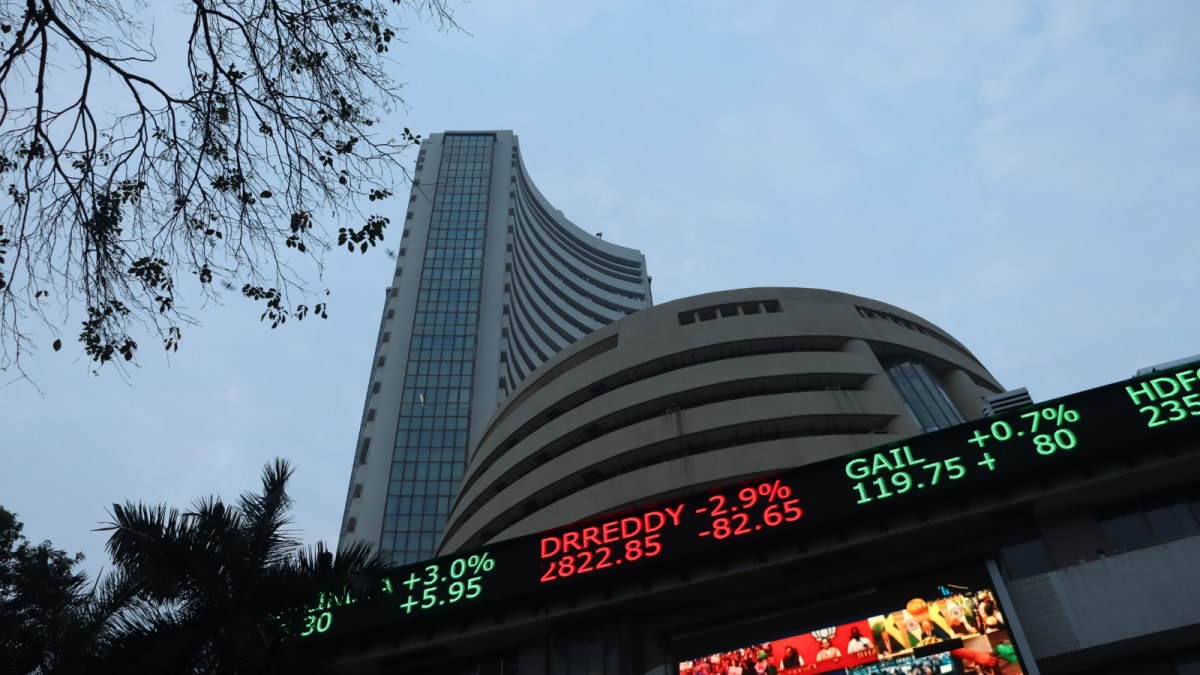
Last Updated:
Foreign Portfolio Investors put Rs 19,675 crore into Indian equities in early February, ending three months of selling amid global cues and a US-India trade pact.


US-India trade deal hopes lift FPI inflows to Rs 19,675 cr in early Feb
Foreign Portfolio Investors Reverse Trend With Rs 19,675 Crore February Buying: Foreign Portfolio Investors (FPIs) made a notable comeback in early February, infusing Rs 19,675 crore into Indian equities during the first half of the month, aided by improving global conditions and the US-India trade agreement.
This marks a clear shift after three consecutive months of net selling. Depository data shows FPIs withdrew Rs 35,962 crore in January, Rs 22,611 crore in December, and Rs 3,765 crore in November.
Even with the renewed buying in February, the broader trend for 2025 remains negative. So far this year, foreign investors have pulled out a net Rs 1.66 lakh crore (USD 18.9 billion) from Indian equities, making it one of the weakest periods for overseas inflows in recent times. Currency volatility, global trade tensions, concerns over potential US tariffs, and elevated valuations had weighed heavily on flows earlier.
Global Cues And Domestic Stability Support Recovery
Himanshu Srivastava, Principal Manager–Research at Morningstar Investment Research India, as quoted by PTI, said the latest inflows were largely driven by easing global macro pressures. Softer US inflation data improved expectations around the interest rate cycle, helping stabilise bond yields and the US dollar. This, in turn, enhanced investor appetite for emerging markets such as India.
On the domestic front, stable inflation, resilient macro indicators, and corporate earnings largely in line with expectations strengthened confidence in India’s economic trajectory, he noted.
Vaqarjaved Khan, Senior Fundamental Analyst at Angel One, also attributed the renewed interest to the US-India trade pact, the growth-oriented Union Budget 2026, easing global trade uncertainties, and steady domestic interest rates.
Volatility Persists Despite Net Buying Days
FPIs were net buyers in seven out of eleven trading sessions in February up to the 13th, turning sellers on four occasions. However, cumulative data indicates a net equity outflow of ₹1,374 crore so far this month.
The divergence was largely due to a sharp sell-off of Rs 7,395 crore on February 13, when the Nifty dropped 336 points. The period also witnessed substantial selling in IT stocks amid the so-called “Anthropic shock.” VK Vijayakumar, Chief Investment Strategist at Geojit Investments, said as quoted by PTI, foreign investors likely reduced exposure to IT stocks aggressively in the cash market, as the IT index fell 8.2 percent in the week ended February 13.
(With PTI Inputs)
February 15, 2026, 16:54 IST
Read More
-

 Business5 days ago
Business5 days agoAye Finance IPO Day 2: GMP Remains Zero; Apply Or Not? Check Price, GMP, Financials, Recommendations
-

 Tech1 week ago
Tech1 week agoNew York Is the Latest State to Consider a Data Center Pause
-

 Fashion5 days ago
Fashion5 days agoComment: Tariffs, capacity and timing reshape sourcing decisions
-

 Tech5 days ago
Tech5 days agoRemoving barriers to tech careers
-

 Fashion5 days ago
Fashion5 days agoADB commits $30 mn to support MSMEs in Philippines
-

 Entertainment5 days ago
Entertainment5 days ago‘Harry Potter’ star David Thewlis doesn’t want you to ask him THIS question
-

 Sports5 days ago
Sports5 days agoWinter Olympics opening ceremony host sparks fury for misidentifying Mariah Carey, other blunders
-
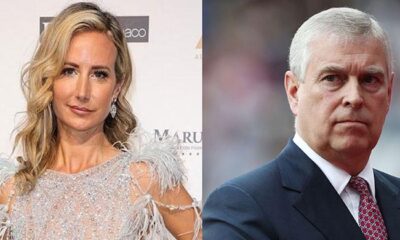
 Entertainment1 week ago
Entertainment1 week agoVictoria Hervey calls out Andrew’s powerful circle in Epstein revelations






